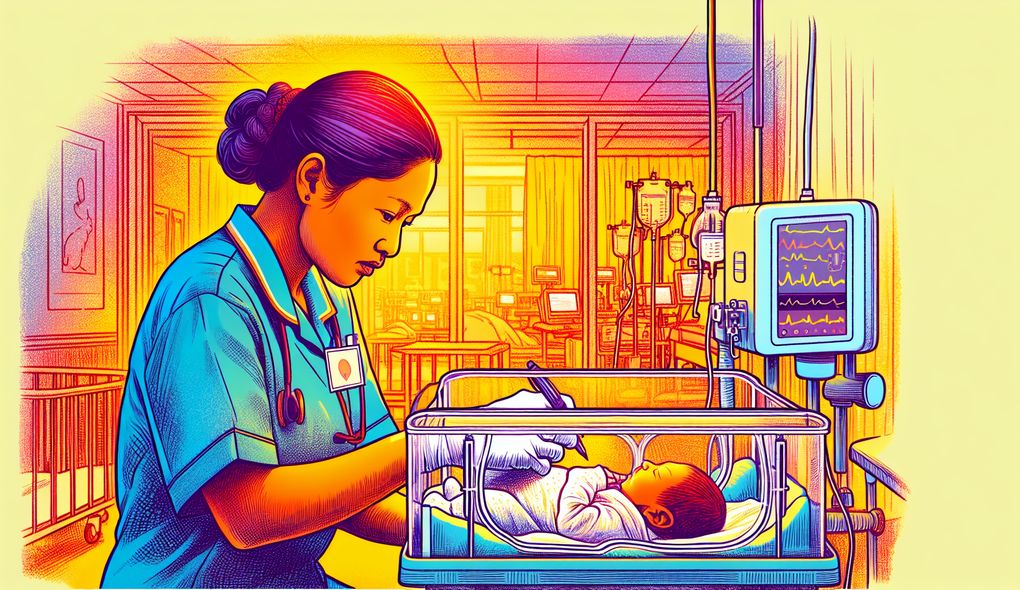Tell me about a time when you had to handle an emergency situation in the NICU. How did you respond?
INTERMEDIATE LEVEL

Sample answer to the question:
During my time in the NICU, I encountered a situation where an infant experienced respiratory distress. I immediately assessed the baby's vital signs and noticed that their oxygen saturation levels were decreasing rapidly. I calmly alerted the neonatologist and prepared the necessary equipment for resuscitation. Working swiftly and efficiently, I initiated bag-mask ventilation while waiting for additional team members to arrive. Once the team was assembled, we collaboratively performed intubation. The baby stabilized after receiving appropriate interventions, and I continued to closely monitor their vital signs and provide ongoing care throughout the shift. This experience taught me the importance of remaining calm under pressure and the significance of effective teamwork in emergency situations.
Here is a more solid answer:
During my time in the NICU, I encountered an emergency situation when a premature baby developed apnea and bradycardia. Immediately recognizing the severity of the situation, I assessed the baby's oxygen saturation levels, heart rate, and breathing patterns. Their oxygen saturation levels were rapidly dropping, and their heart rate was decreasing. I calmly alerted the neonatologist and informed them of the critical situation. While waiting for the neonatologist to arrive, I prepared the necessary equipment for resuscitation. With a clear understanding of the steps involved, I initiated bag-mask ventilation to provide the baby with the necessary oxygen support. I continuously monitored the baby's vital signs, adjusting the ventilation settings as needed. Once the neonatologist arrived, we collaborated to perform intubation and administered medication to stabilize the baby's condition. Throughout the entire process, I provided reassurance and clear communication to the parents, ensuring they understood the situation and the steps being taken to save their baby's life. This experience highlighted the importance of my clinical skills, quick decision-making abilities, and effective communication in handling emergency situations in the NICU.
Why is this a more solid answer?
The solid answer provides specific details of the emergency situation and demonstrates the candidate's clinical skills, quick decision-making abilities, and effective communication with families. It also emphasizes the importance of reassurance and clear communication during high-stress situations. However, the answer could further showcase the candidate's proficiency in assessing patient health and implementing appropriate interventions and their compassion and sensitivity to the needs of newborns and their families.
An example of a exceptional answer:
During my time in the NICU, I faced a highly stressful emergency situation involving an infant who presented with GRDS (Grade III Respiratory Distress Syndrome). It was a challenging scenario as the baby required immediate and intensive medical intervention. I initiated a thorough assessment, which included evaluating the baby's oxygen saturation levels, respiratory effort, and heart rate. The situation was critical, with the baby showing signs of severe distress. Utilizing my expertise in neonatal care and based on the assessment findings, I quickly implemented interventions. I skillfully performed nasal continuous positive airway pressure (CPAP) to improve ventilation, administered exogenous surfactant therapy, and closely monitored the baby's vitals. Additionally, I provided constant emotional support and education to the parents, ensuring they were informed and involved in the baby's care journey. Thanks to the collaborative efforts of the healthcare team, the baby responded positively to the interventions, and their condition improved over time. This experience reinforced my clinical proficiency, ability to make rapid yet accurate decisions, and compassion towards newborns and their families in critical situations.
Why is this an exceptional answer?
The exceptional answer goes above and beyond by providing specific details of the emergency situation, including the diagnosis of GRDS and the interventions implemented, such as nasal CPAP and exogenous surfactant therapy. It also highlights the candidate's ability to provide constant emotional support and education to the parents, showcasing their compassion and sensitivity to the needs of newborns and their families. The answer demonstrates the candidate's clinical expertise, quick decision-making abilities, and their commitment to delivering high-quality care in emergency situations.
How to prepare for this question:
- Familiarize yourself with common emergency situations that can occur in the NICU, such as respiratory distress, apnea, and sepsis.
- Study and refresh your knowledge on neonatal resuscitation techniques and protocols.
- Reflect on past experiences in the NICU where you handled emergency situations and think about the specific skills and qualities you showcased.
- Practice explaining the steps involved in handling an emergency situation in the NICU, emphasizing effective communication with families.
- Stay updated on the latest advancements and best practices in neonatal care to enhance your clinical skills and decision-making abilities.
What are interviewers evaluating with this question?
- Strong clinical skills with a focus on neonatal care.
- Excellent communication and interpersonal skills with the ability to educate and comfort families.
- Critical thinking and quick decision-making abilities.
- Proficiency in assessing patient health and implementing appropriate interventions.
- Compassion and sensitivity to the needs of newborns and their families.

